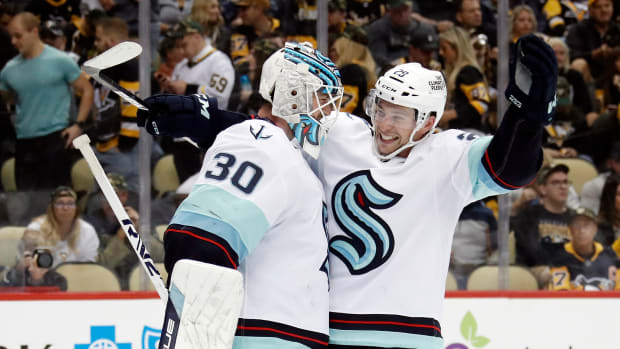The expectations on the Seattle Kraken heading into the 2022-23 season were tempered by a typically-traditionally-bad inaugural campaign.
Nobody in Seattle had visions of the second coming of the Vegas Golden Knights in their amazing first year of competition, and so, when the Kraken finished 37 standings points out of the playoff mix with a 27-49-6 record, there was no clutching of pearls, no calls for coach Dave Hakstol’s firing, no sense of letdown. Yes, things could have gone better, but there were no illusions about their place in the league’s pecking order.
The bar for the Kraken was set low again for them this season, but something unexpected happened: after stumbling out to a 1-2-2 start, Seattle has gone 6-2-0, and they’re currently on a four-game win streak that includes two wins over the Pittsburgh Penguins and victories over Calgary and Minnesota. That has pushed them to the No. 2 position in the Pacific Division, and, relatively quietly, some people are looking at the Kraken as a dark horse contender for one of the lower playoff seeds.
But let’s not get ahead of ourselves. A ton of things are going to have to go right for Seattle to be in a playoff race at the end of the regular season, and while a couple elements of their game has surged and improved, there are some nagging problem areas that could be the difference between making and missing the post-season.
First, the positives: after finishing last year with the NHL’s fourth-worst offense (that averaged only 2.60 goals-for per game), the Kraken have boosted their total goals-for to 3.46, the league’s ninth-best number in that area. Additionally, they’ve improved their power play, from the NHL’s fourth-worst at 14.6 percent last season, to the league’s ninth-best this season at 26.1 percent. New additions Andre Burakovsky (seven assists, 10 points in 13 games), Oliver Bjorkstrand (six assists, seven points) and star rookie Matty Beniers (five goals, nine points) have added depth and balance to Seattle’s offense, and they’re also getting solid contributions from their defensemen.
However, the problem for the Kraken remains their play in their own zone. They’ve slightly improved on their 2021-22 goals-against average of 3.46 per game (ranking them ninth-worst in the league) and their penalty kill that year (74.9 percent, second-worst in the NHL) to 3.08 (14th in the NHL) and 73.8 percent (23rd in the league) thus far this season.
Their defensive numbers haven’t gotten worse, but the fact remains they’re a work in progress on the back end, and goalies Martin Jones, Joey Daccord and injured starter Philipp Grubauer haven’t stolen any games. In all of its six losses, Seattle has given up either four or five goals. That has to change in a hurry if the Kraken are to keep up with teams like Edmonton, Calgary and Los Angeles in their division.
You can forgive us, then, if we’re not completely prepared to jump on the Kraken bandwagon just yet. The shine may be off their bumper as soon as three weeks from now, as, out of their next 10 games, Seattle has only two opponents – Anaheim and San Jose – they should beat. The other eight games come against teams under big-time pressure to win games – Nashville, the Wild, Winnipeg, the Rangers, the Kings (twice), the Golden Knights and Washington. Nothing is going to come easy for them.
Few picked the Kraken to make the playoffs this year, so at this point, they’re playing with house money. Seattle fans and media won’t be happy with regression of any facet of their game, but if the Kraken can take another small step forward, they won’t face much, if any backlash.
Perhaps next season will be different, and fan patience will begin to run dry. But savvy supporters know this is a process, and that means they can’t lose sight of the forest because of the trees. Their fans should enjoy the success they’ve had this season, but being expectant of continued success at this level is setting yourself up for disappointment.



